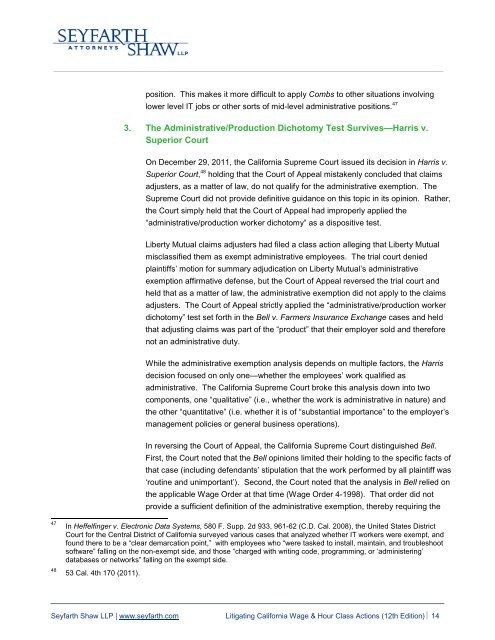Litigating California Wage & Hour and Labor Code Class Actions
Litigating California Wage & Hour and Labor Code Class Actions
Litigating California Wage & Hour and Labor Code Class Actions
You also want an ePaper? Increase the reach of your titles
YUMPU automatically turns print PDFs into web optimized ePapers that Google loves.
position. This makes it more difficult to apply Combs to other situations involving<br />
lower level IT jobs or other sorts of mid-level administrative positions. 47<br />
3. The Administrative/Production Dichotomy Test Survives—Harris v.<br />
Superior Court<br />
On December 29, 2011, the <strong>California</strong> Supreme Court issued its decision in Harris v.<br />
Superior Court, 48 holding that the Court of Appeal mistakenly concluded that claims<br />
adjusters, as a matter of law, do not qualify for the administrative exemption. The<br />
Supreme Court did not provide definitive guidance on this topic in its opinion. Rather,<br />
the Court simply held that the Court of Appeal had improperly applied the<br />
“administrative/production worker dichotomy” as a dispositive test.<br />
Liberty Mutual claims adjusters had filed a class action alleging that Liberty Mutual<br />
misclassified them as exempt administrative employees. The trial court denied<br />
plaintiffs’ motion for summary adjudication on Liberty Mutual’s administrative<br />
exemption affirmative defense, but the Court of Appeal reversed the trial court <strong>and</strong><br />
held that as a matter of law, the administrative exemption did not apply to the claims<br />
adjusters. The Court of Appeal strictly applied the “administrative/production worker<br />
dichotomy” test set forth in the Bell v. Farmers Insurance Exchange cases <strong>and</strong> held<br />
that adjusting claims was part of the “product” that their employer sold <strong>and</strong> therefore<br />
not an administrative duty.<br />
While the administrative exemption analysis depends on multiple factors, the Harris<br />
decision focused on only one—whether the employees’ work qualified as<br />
administrative. The <strong>California</strong> Supreme Court broke this analysis down into two<br />
components, one “qualitative” (i.e., whether the work is administrative in nature) <strong>and</strong><br />
the other “quantitative” (i.e. whether it is of “substantial importance” to the employer’s<br />
management policies or general business operations).<br />
In reversing the Court of Appeal, the <strong>California</strong> Supreme Court distinguished Bell.<br />
First, the Court noted that the Bell opinions limited their holding to the specific facts of<br />
that case (including defendants’ stipulation that the work performed by all plaintiff was<br />
‘routine <strong>and</strong> unimportant’). Second, the Court noted that the analysis in Bell relied on<br />
the applicable <strong>Wage</strong> Order at that time (<strong>Wage</strong> Order 4-1998). That order did not<br />
provide a sufficient definition of the administrative exemption, thereby requiring the<br />
47<br />
48<br />
In Heffelfinger v. Electronic Data Systems, 580 F. Supp. 2d 933, 961-62 (C.D. Cal. 2008), the United States District<br />
Court for the Central District of <strong>California</strong> surveyed various cases that analyzed whether IT workers were exempt, <strong>and</strong><br />
found there to be a “clear demarcation point,” with employees who “were tasked to install, maintain, <strong>and</strong> troubleshoot<br />
software” falling on the non-exempt side, <strong>and</strong> those “charged with writing code, programming, or ‘administering’<br />
databases or networks” falling on the exempt side.<br />
53 Cal. 4th 170 (2011).<br />
Seyfarth Shaw LLP | www.seyfarth.com <strong>Litigating</strong> <strong>California</strong> <strong>Wage</strong> & <strong>Hour</strong> <strong>Class</strong> <strong>Actions</strong> (12th Edition) 14
















